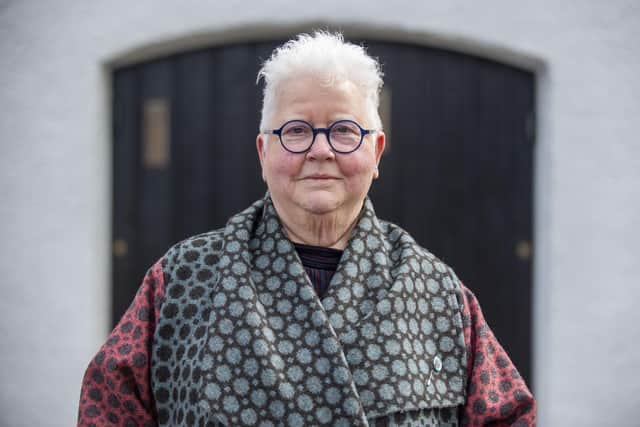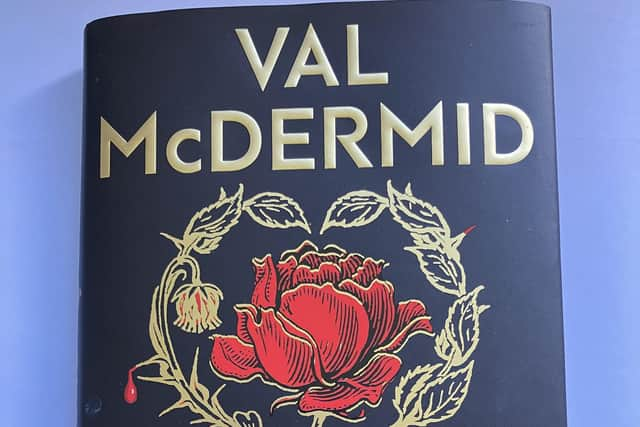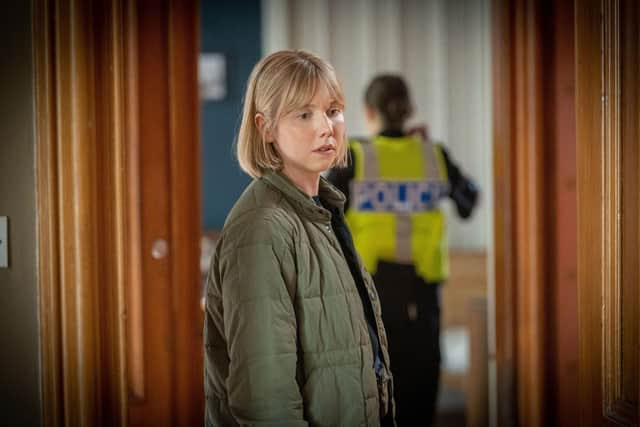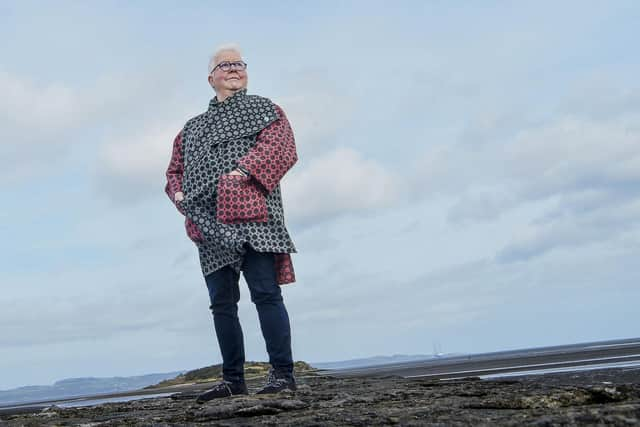Val McDermid's new book kills the myths about Queen Macbeth
The clues were there early on that Val McDermid had the potential to become one of the world’s leading crime writers, a multiple-award winning household name with 39 books translated into more than 40 languages and sales of 19 million.
At the age of five, lying isolated in her darkened bedroom in Kirkcaldy suffering from measles, she was comforted by her mother sitting outside the door reading her The Wind in the Willows.
“Yes, Mr Toad gets sent to prison and does a jailbreak dressed as a laundress. That’s a very vivid memory,” she recalls when we meet in The Scotsman office, honing in on the darker elements of Kenneth Grahame' enchanting pastoral children’s tale.


Later, after graduating from Oxford where at 17 she became the first state school pupil to study at St Hilda’s College, she became a journalist who earned herself the prophetic nickname of ‘Killer’.
“Because I always killed it. I got the story,” she says.
It was this tireless approach to chasing down a story, combined with curiosity and ability to weave a yarn that saw her quit the day job in 1991 to become a full time author with a string of bloody best selling novels, radio plays, TV series, short stories, non-fiction and a children’s book.
An only child, her love of reading was instilled from a young age with her mother taking her in a pushchair to the local library.


“My mum used to take me when I was about two or three, before I could read and we’d look at picture books and then when I could read myself, it was just a case of devouring books. Other worlds.”
Now 68, McDermid lives between Edinburgh and Fife with her partner Jo Sharp, a professor at St Andrews University and Scotland’s Geographer Royal, and divides her year between writing and promoting her books.
The latest of these is Queen Macbeth, the fifth in the Darkland Tales series which sees writers take a dark episode from Scottish history and rework it in novella form for a modern audience. Denise Mina has reimagined the murder of Rizzio, Jenni Fagan explored the North Berwick Witch Trials, Alan Warner took on the Culloden aftermath and David Greig revisited Iona in the days of Columba.
In the standalone tale, McDermid goes back a thousand years to look again at the Scottish king and queen, challenging Shakespeare’s historically inaccurate view, to give us a whole new take.


This is no Lady Macbeth. McDermid uses her name, Gruoch, a woman about whom few facts are known, other than she was born around 1015, was married to Gille Coemgáin mac Maíl Brigti then his cousin Macbeth, and the pair ruled what is now Scotland for 17 years.
With very little written down about the Macbeths, McDermid was free to fill in the bits left to the imagination and the book opens with Gruoch in exile on an island in a loch, running for her life with her three companions - a seer, a healer and a weaver - in a page-turning tale of adversity and adventure, laughter and love, death and defiance.
“Nobody can tell me that I’ve got it wrong because the bits that we know to be the case, I’ve got right,” says McDermid. “There was no paper in Scotland in the 11th century which is why we have no historical record in the way that the English have the Venerable Bede and the Jarrow Gospels. We have vellum that the monks did the beautifully illustrated gospels on but the people, even high heid yins, didn’t have any way of recording what was going on, which is why there are so many lovely gaps to fill in.”
“I discovered there was no paper after I’d written my first draft,” she says. “There are two characters who have to communicate and I had them exchanging letters but the publisher said that was impossible so I had to come up with a solution.


What does she do when she runs up against a problem like this in her writing?
“Scream. I often hit myself on the head and go ‘how can you be so stupid?’ I’d done lots of research but it had never come up that there wasn’t any paper. So what I do is brainstorm with my editor or my partner and in this instance my partner and a friend who was round for dinner.”
The friend in this case being Nicola Sturgeon.
“Yes, we threw it round the table and one of them, I can’t even remember which, said what about the language of flowers and I thought yes, absolutely, because I had researched that and it worked.”
Thus the meaning of various flowers became integral to the plot and along with a stark white skull on a black background, they bloom in bold red on the final version of the cover which McDermid has just received in an email.
“Look,” she says, showing me the cover. “Brilliant. I’ll get that on a T-shirt, wear it as my new gig shirt,” referring to her role as lead singer in the band, Fun Lovin Crime Writers with Mark Billingham, Chris Brookmyre, Luca Veste, Stuart Neville and Doug Johnstone, who she also tells me will be performing at Glastonbury again this year. Performing music live is nothing new for McDermid who grew up in the Fife music scene in the days of Billy Connolly, Gerry Rafferty and Barbara Dickson.


“I usually wear my Val McDermid Quine of Crime T-shirts, which I got printed as a ripost to the Agatha Christie estate who got very heated about my publishers using the term Queen of Crime,” she smiles.
With the invitation to write about Queen Macbeth, came the freedom to choose how she did it.
“I thought a historical setting would be fascinating because she’s such a strong mythological figure in what people think of as Scottish history.
“Part of the purpose of the Darkland Tales is to strip away the mythology and the romantic telling of stories to get back to the heart of what actually is the story of our history and so often that involves women being scrubbed out of the picture or transformed into creatures of evil power and malign intent.
“So Jenni Fagan did Hex about the witch trials, Denise Mina’s Rizzio takes the view of Mary, Queen of Scots being put in a very difficult and historically insulting place and certainly Lady Macbeth has been traduced by Shakespeare. There are reasons for that, mostly political, because James I and VI’s line of succession was through Banquo’s line, not Macbeth’s, and he was one of the patrons of theatre companies at the time, hence Lady Macbeth.”
“It’s quite clear the Macbeths weren’t murderous tyrants,” she continues. “They ruled for 17 years. The kingdom was so secure they were able to go on a pilgrimage to Rome.
You don’t walk away from your kingdom if it’s shoogly, certainly not in the middle ages where people were always waiting in the wings to steal it from you,” she says, referring to one of the lighter episodes in the book where Gruoch and Macbeth enjoy a trip to medieval Rome, meet the Pope and bump into their pal from home, Yorfinn the Viking, Yarl of Orkney.
“I thought it was an important story to tell because so often women are erased from history, particularly early history where women had no public voice and were turned into witches or difficult women who were exiled. I wanted to recognise that women played an important role in the life of the period - they must have been doing something significant to get their heads cut off.
“It was interesting to tell a story that would draw people in and make them go ‘maybe Shakespeare wisnae right after all’. Because she’s become such an iconic figure, this psychopath who schemed to get her husband on the throne of Scotland, ably assisted by a bunch of witches. And it’s not really how it happened. It was a chance to set some of the record straight about the period where Scotland was created. Macbeth has been painted as a despot seeking power with this woman at his back to push him to the next step and I don’t think it’s a very credible picture of the time.
“Gruoch was born into what would pass for Scottish nobility and didn’t want to be just a wife stuck in the cupboard. She was basically bartered off in her first unhappy marriage, then found love. She’s strong, tough, somebody that gives her heart to the people she cares about - her son, serving women, husband, friends. She is loyal and determined and has an eye to her people as well.”
Back in a newsroom today, it’s familiar territory for McDermid who worked as a journalist for 16 years, including stints at The Daily Record and latterly as northern bureau chief for a national Sunday tabloid, but she doesn’t miss it.
“Especially not when a big story breaks on a Saturday, I think thank god I’m not running the office for this. I would do the night desk on Friday and Saturday and you’d get a story coming in at 2 o’clock on Saturday morning and your heart would sink. All the running about, getting people to talk and getting something that everybody else just didn’t have.”
A case in point being the Lockerbie bombing which happened on a Friday night before Christmas in December 1988. ”I remember it well” says McDermid who was on shift that night, and the tragedy features at the start of the second Allie Burns novel, 1989. But McDermid has no desire to record her experiences in a memoir.
“I think if you’re going to do it properly you have to be truthful and an awful lot of people would have to die before I could do that. I don’t want to inflict pain on people who have pissed me off over the years or done things to derail my life. What’s the point?”
“And I feel there’s a weird obsession with the writer’s life informing their work because the very nature of writing fiction is you use your experiences but transform them through the process of imagination and use that material to make characters that feel authentic.”
“There’s also a sense that there are things that are nobody’s business. There are times when you just want to retreat. I’ve always been aware of that because as a journalist I would be invading people’s private spaces and trying to get it on the page, so I’ve always felt the need to have a place of retreat. My son’s 23 now and I’ve never posted a picture of him as a child on social media.”
She may be private but McDermid is a sociable person who is great company, fun and forthright, chatty as we exit the office and head for Cramond to take photographs. Despite nursing a ‘knackered’ back, she gamely ventures along the irregular flagstones of the causeway and perches on a tree trunk deposited by the storm on the beach.
As we shoot the breeze, sheltering in a wynd and waiting for a lift back, the conversation covers the smoke and typewriter filled newspaper offices of old, indyref, meeting Queen Camilla who told her she needed no introduction and was given an early copy of Queen Macbeth and the joys of travel, especially to New Zealand where she is visiting professor of Scottish studies and crime fiction at the University of Otago in Dunedin. She recommends the most interesting Edinburgh graveyards and discloses that ‘neuk’, while it means corner in Scots, also means sex in Dutch - “that’s where nooky comes from. One of my friends says to me ‘are you off to the East F*** this weekend?’.
With her shock of shorn white hair, recently shaved at the sides, round dark glasses and red, grey and black wool coat, she is a recognisable figure, and as a man squeezes past us he says, ‘If you’re Val McDermid, I like your work.’
“I am,” she confirms and smiles. “Thank you.”
As well as the standalone Queen Macbeth, McDermid is also touring the latest titles in her two current series featuring policewoman Karen Pirie and journalist Allie Burns. There are seven Karen Pirie books so far, with Past Lying (2023) being made into a second TV series starring Lauren Lyle as DCI Pirie - McDermot is a fan of the actor, but was against the bum bag – “I thought as a working police officer she’d have too much stuff to carry around” - and 1989, the follow up title to 2021’s 1979 thriller, sees investigative journalist Allie Burns now the northern bureau chief for a Sunday newspaper.
“I was about to write 1999 but for various reasons it just wasn’t ready,” says McDermid, “so I’ve put that to one side and I’m writing a Karen Pirie. I’ll go back to 1999 next year.
“It’s very gratifying that people are great Karen Pirie fans. They talk about her like she’s one of their pals and get quite outraged if they don’t like where I’m going with her. The number of conversations you have along the lines of ‘I don’t think Hamish is right for her’ or ‘Hamish has really cheered her up’. They also have very strong views about Allie Burns. There’s a school of thought that says Rona’s not right for her and I get that in my ear quite a bit but we’ll have to see how things go between them. It’s good that people feel that relationship to characters.”
As well as writing the latest Karen Pirie and performing at Glastonbury, McDermid and Sharp will be visiting New Zealand again this year.
“We’re going back this year and stopping off in Singapore. There’s a rail journey where you can go up into the Malaysian interior and, amongst other things, visit a tiger refuge, so I’m really looking forward to that.
“One of the great things about book tours, events and festivals, is you’re in the hands of local people so if you say I’ve got a free afternoon, what’s should I go and see, they’ll take you. That’s the kind of thing that falls into your lap and I’m a great snapper up of those passing trifles.”
Does she ever worry she might not be able to come up with the next book?
“Every time,” she laughs. “I remember hearing William Golding being interviewed not long before he died and the interviewer said you must feel a great sense of delight and relief when you finish a book and he said ‘no, what I feel is panic and will I ever be able to do this again?’
“Every book you finish you think will I be able to do this again?, how do I build on my experience to do something better and different? I don’t want to repeat myself.”
“Past Lying, the last Karen Pirie, has had astonishing reviews on both sides of the Atlantic and is shortlisted for an Edgar Award and is up for other awards, and it surprises me every time. But it also reassures me that I’m not just drifting into some terrible twilight of the writer’s life.
“I want to keep on doing this and doing it well. I want to be like Ruth Rendell. When she was taken to hospital with the massive stroke that ultimately killed her, in her handbag was a memory stick with the first draft of her final novel, which was later published.”
So McDermid is never going to stop?
“No! Why would I? What would I do with my days? I’d just be really annoying to everybody else, you know. Play with me!”
Queen Macbeth, by Val McDermid, is the latest in the Darkland Tales series, £12, Polygon is published on 2 May.